A sense of outrage and sorrow swept through Hawaii today as a former youth basketball coach received a lengthy prison sentence for a series of horrifying crimes against children.
Dwayne Yuen, 52, of Honolulu, was sentenced to over 33 years behind bars, followed by a lifetime of supervised release, after being convicted of enticement of a minor, sex trafficking of a minor, production and receipt of child pornography, and harassment offenses.
Officials Speak Out on the Severity of the Crimes
“The defendant was a youth basketball coach who shamelessly sexually exploited, abused, harassed, and threatened his young victims, causing incalculable harm to them,” said Acting Assistant Attorney General Matthew R. Galeotti.
“We remain steadfast in our commitment to secure justice for victims of these atrocious crimes, especially when such acts are committed by individuals who seek and abuse the trust of their communities in order to target and exploit vulnerable children.”
Acting U.S. Attorney Ken Sorenson for the District of Hawaii added, “Dwayne Yuen grossly and repeatedly violated the sacred trust placed in him by his employer and the parents and families of his young female victims.
He used his power and position to groom and then serially exploit and victimize the young girls entrusted to his care.
While nothing can ever undo the harm he has caused, it is our hope that today’s sentence protects our community and serves as a warning to other predators.”
FBI Highlights Abuse of Trust
FBI Criminal Investigative Division Assistant Director Jose A. Perez emphasized the breach of trust inherent in Yuen’s crimes.
“Yuen held a position of trust that demanded he protect and inspire young athletes.
Instead, he abused his authority by preying upon and threatening his young victims. Today’s sentencing reinforces that victimization of children will not be tolerated.”
Perez further noted that the FBI remains committed to carefully investigating child exploitation cases, ensuring that offenders face justice while vulnerable children are protected.
Extensive Pattern of Grooming and Exploitation
Court documents reveal the scope of Yuen’s crimes. Over nearly two decades, from 2005 to 2023, Yuen used his position as a basketball coach and mentor to groom at least ten victims.
Many of the children were especially vulnerable due to financial or family hardships.
He purchased elaborate gifts, spent inappropriate time alone with them, and gradually initiated sexual conversations, including sending explicit images.
In the early 2000s, Yuen coerced sexual contact with victims as young as 15, using threats to damage their reputations and basketball careers if they resisted or disclosed the abuse.
Some victims were threatened with rape and death, blackmailed, or physically assaulted.
Later, Yuen paid economically vulnerable players to send sexually explicit images or engage in explicit conversations.
In one particularly disturbing incident in 2020, he convinced a minor to participate in a sexually explicit video call, took screenshots, and shared them with another victim.
He also harassed former players via phone, sometimes sending hundreds of messages daily from unidentified numbers.
Law Enforcement and Prosecution
The FBI Honolulu Field Office led the investigation.
The case was prosecuted by Trial Attorney Gwendelynn Bills of the Criminal Division’s Child Exploitation and Obscenity Section (CEOS) and Assistant U.S. Attorney Rebecca Perlmutter.
Part of a Nationwide Effort to Protect Children
This prosecution falls under Project Safe Childhood, a national initiative launched in 2006 by the Department of Justice to combat the growing epidemic of child sexual exploitation.
By coordinating federal, state, and local resources, the program aims to locate, apprehend, and prosecute offenders while identifying and rescuing victims. For more information, visit www.justice.gov/psc.
